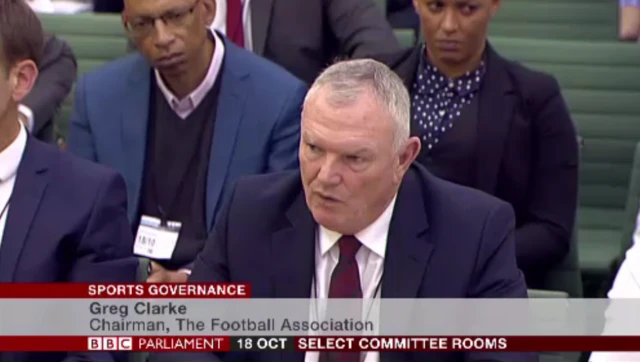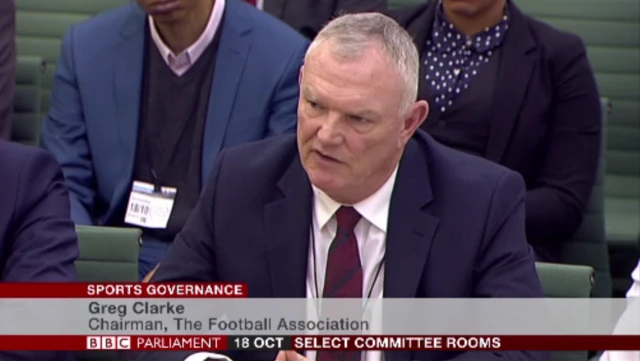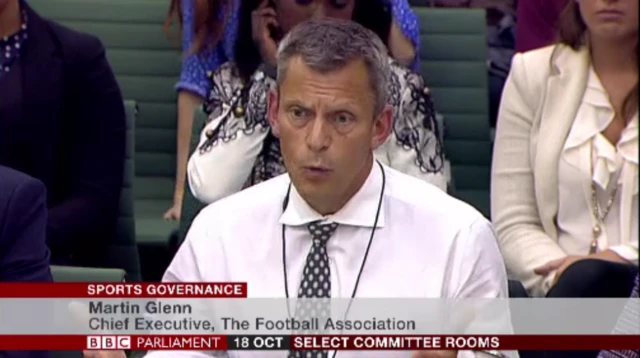Postpublished at 18:49 BST 18 October 2017
And that concludes our coverage of the hearing.
For a full breakdown on what was said, head here.
FA bosses faced parliamentary inquiry over racism allegations
Eniola Aluko has accused ex-England boss Mark Sampson of discrimination
FA apologises over remarks to Aluko & Drew Spence
And that concludes our coverage of the hearing.
For a full breakdown on what was said, head here.
And here are some of the key clips:
FA chief's request 'bordering on blackmail' - Aluko
I still couldn't tell you what the FA grievance process is
I didn't expect it to be Eni Aluko versus the FA
And with that, the hearing comes to an end.
Right, I'll pick through the last four hours and provide you with the key points.
The FA execs are questioned about a female linked with Leeds United asking for support with regards to discrimination...
Greg Clarke: "It sounds outrageous. I will find out what is going on."
To fail to act over two discrimination cases is careless, Clarke is told.
Clarke: "Is there sexism in football? Absolutely. Do we have the powers to deal with it? We don't have the power in the FA to overcome statute. I need to give you a reasonable response on our powers and what we could do. Us interfering with legal issues is really hard."
 Image source, Getty Images
Image source, Getty ImagesHas Mark Sampson received a pay-off?
Martin Glenn: There is a payment related to his contract, but it is not a 'pay-off' as such.
Rachel Brace: It was in line with his contract. It was nine months' salary.
Glenn: We've been informed by his (Mark Sampson's) solicitor that he's considering filing a claim for wrongful dismissal.
More from Greg Clarke: "Now, what I know today, I don't think the process found an effective result quickly enough.
He is then asked if he accepts it was because of mistakes in the FA and it should have been done differently?
"We took too long to get to the right answer because we weren't clear on our procedure and we allowed mistakes to occure.
"I will apologise to Eni personally. What will happen is I will get up, shake her hand and ask to speak to her personally. I will listen to her reflections. I want to engage with her."
 Image source, Getty Images
Image source, Getty ImagesMartin Glenn is asked how satisfied he is with the process:
"I'm trying to inject a sense of balance. We don't only exist to run internal grievance processes. Do I believe the spirit and intent of the people leading the investigation was right? Yes. No-one forced us to get in a separate independent barrister. That factor should be weighed in.
"I think you've got to be proportionate about the nature of the mistakes.
"We're open to learning. We're working with UK Sport to deal with what is clearly an issue in elite sport. Grievance processes that may work for a general organisation aren't fit for purpose in elite sport.
"I would go intentions."
We are three-and-a-half hours into this hearing and these are the key points so far.
Martin Glenn is asked whether the FA failed in its duty of care:
"There have clearly been failings. I wouldn't want to then say the organisation is failing. Clearly in this situation there have been failings.
We have 900 members of staff. On balance I think we do a good job.
 Image source, Getty Images
Image source, Getty ImagesFA chairman Greg Clarke is criticised for referring to institutional racism as "fluff". He quickly apologies after being chastised by the committee.
"What has established, putting aside all the fluff about, you know, institutional racism, no institutional bullying," he says.
The fact you describe it as fluff speaks volumes," says Julie Elliott MP. "Language matters."
"I accept your point and what I was trying to say, maybe badly, is I could get distracted by the irrelevant," Clarke adds. "I shouldn't have said fluff. I could have come in and said, well Katharine Newton said there's no evidence of systemic bullying, there's no evidence of systemic racism.
"But that's not the issue, that's why I mis-characterised it as fluff. I didn't want to talk about that, what I wanted to talk about was the material issue and I apologise for phrasing it badly. The material issue is twice an England player with 100 caps was exposed to a situation where racist abuse happened. That is a fundamental breach of our duty of care for that person and I feel very bad about that."
Allow X content?
This article contains content provided by X. We ask for your permission before anything is loaded, as they may be using cookies and other technologies. You may want to read X’s cookie policy, external and privacy policy, external before accepting. To view this content choose ‘accept and continue’.
On Eni Aluko being dropped from the England squad.
Dan Ashworth: "The head coach picks the team, not me. The head coaches would pick the team on a variety of issues.
"Who he or she thinks will do the best job for that team going forward. He had been disappointed with recent performances and he dropped a few senior players, including Eni Aluko."
But how can somebody, that successful, be dropped directly after giving evidence. That can't be a coincidence?
Dan Ashworth: "What I would say is Mark would have picked the team on form. Knowing the facts that I do, no it does not seem a coincidence. To the outside world? Yes."
 Richard Conway
Richard Conway
BBC Radio 5 live sports news correspondent
FA HR director Rachel Brace proving an effective shield in these proceedings for Clarke, Glenn and Ashworth.
Rachel Brace is asked if she evaluated the FA's review processes upon being appointed in January 2016:
The FA has very good grievances and complaints procedures for its corporate employees. I'd been in the post for five or six months, I found we didn't have anything in place for our national teams. This was something really wanting across elite sport.
I evaluated where we had fallen short as an organisation. One of the things we're doing with UK Sport is we're talking to our players and coaches and saying, 'how does this work for you?' What works in a corporate context doesn't always work in a sporting context.
Was the initial investigation adequate?
It was done in the best way we could. There's some things we could have done better. I do think it was adequate. There are things I would do differently, absolutely. I've learned there's no such thing as an easy grievance procedure. When you're trying to do the best by everybody, you won't always get it right.
We need to be very clear about the 'rules of the road'. In corporate life, people understand you come with a grievance and it's going to be investigated, and not everything is going to be confidential. In a sporting context, people are more focused on information getting to the media. They're worried about what their colleagues think of them, whether they're going to be picked or not.
Would you still say the investigation was adequate?
Based on what I knew at the time, yes.
Julie Elliott MP asks Martin Glenn if he accepts the FA has failed in its duty of care to players.
"We have clearly made mistakes," he replies.
"You can't say you have failed in your duty of care. I think that speaks volumes," says Elliott.
You say 'overwhelming duty of care to victims' - Eni Aluko has been one. Has your organisation given an adequate duty of care?
Greg Clarke: "No. The material issue is that twice, an England player with over 100 caps, was exposed to situations where racial discrimination was used and I feel very bad about that. We have to apologise. We now have facts that our board needs to be aware of and they need to actively consider the decision to pay as part of our duty of care to her."
Julie Elliott MP then states she feels that Aluko must be paid.
Martin Glenn: "Safeguarding rules are universal, they are based on law. The job of the safeguarding team is to judge whether someone poses a risk as a football participant.
"What I am sure about is that as a safeguarding risk he was investigated and cleared. As a conduct issue, we judged his conduct was inappropriate."
Asked about the FA's safeguarding code of practice:
"The problem was the issue was seen in its narrowest form, as a safeguarding issue, not in its wider form. We now do that differently. We've got different people who can take a wider holistic view."
Dan Ashworth says he was aware of the "outline of the allegations" against Mark Sampson, but not the full detail.
"I wasn't shown a report," he says. "I was given an update through the process of the investigation.
"I was told when the panel was concluded and was told there was no risk in his role. I wasn't aware of any detail. They said he would pose no risk in his current role.
It seems odd you could be reassured without having been given knowledge?
Ashworth: "Of course if I had my time again I would have asked for more detail. At the time, I didn't ask for it and wasn't given any.
"I went off the recommendation of the panel."
On Mark Sampson hiring as England manager in 2013...
Greg Clarke: "What should have happened was a process of due diligence - which does happen now - but did not happen then.
Martin Glenn is asked why it took so long to read the safeguarding report that led to Sampson's dismissal: The report was written in March 2015. The report was a safeguarding report. The standard practice is to maximise confidentiality. The report that was written, I wasn't shown. It wouldn't have been appropriate. I should have been aware there were wider concerns from the report. I hold my hands up. If I'd have known then what I know now, I would have asked.
Rachel Brace: The information was given to me. I won't name the name. As soon as the information was given to me, it made me go back and ask questions.
Glenn: There is a difference between safeguarding, which was done well, and the mess in the FA, which was a failure to look at our employment procedures. We are doing things differently now.
When the employment recommendation was made to me, we acted swiftly.